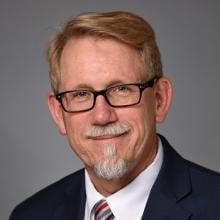- Featured institution and leadership
- What are your Accelerating Change in Medical Education project and goals?
- What are some recent accomplishments that would be of interest to others in the medical community?
- How has your work prepared you to respond to disruptions related to COVID-19?
- What do you think will change about medical education in the next five years?
- Can you share some strategies to maintain team engagement and well-being in this challenging time?
Each month, the AMA highlights institutions that are part of the AMA Accelerating Change in Medical Education Consortium to showcase their work with the consortium and innovations in medical education.
Featured institution and leadership
Bradley L. Allen, MD, PhD
Senior associate dean for medical student education
Indiana University School of Medicine
Number of years in the consortium: 8 years
What are your Accelerating Change in Medical Education project and goals?
The initial AMA funding of Indiana University School of Medicine (IUSM) created the teaching electronic medical record (tEMR), which utilizes an authentic medical record platform with de-identified patient data for training students and residents in the optimal and efficient care of patients. The tEMR is still utilized at IUSM and several additional consortium and non-consortium institutions nationally. The initial funding also trained faculty in the effective delivery of health system science (HSS) content in the competency-based curriculum IUSM initiated in 2016. These innovations contributed to the success of our well-rounded graduates and prepared IUSM for its next phase of change.
Subsequent projects created community health improvement projects (CHIP) where student groups paired with community physicians to identify existing challenges ineffective care delivery and developed strategies to address these hurdles in the context of the barriers and resources needed for community engagement. The IUSM Scholarly Concentration program arose to provide students with the opportunity to engage in the targeted study of health care topics that leverage the unique expertise available at each of the school’s nine campuses and results in an area of distinction for the student at the time of graduation.
What are some recent accomplishments that would be of interest to others in the medical community?
Our previous emphasis on an HSS focus in the IUSM program gave us a perfect opportunity to compete for additional funding from the United States Health Resources and Services Administration (HRSA) for the Primary Care Reaffirmation for Indiana Medical Education (PRIME) project in 2020. This exciting program focuses on objectives to enhance the classroom content and clinical learning experiences to promote the delivery of high-quality primary care to underserved populations in Indiana. IUSM has utilized this funding to develop a new competency focused deliberately on skills needed for health equity, diversity and inclusion. In addition, the disparate impact of COVID-19 on vulnerable communities called for creation of a curricular thread focused on the impact of systemic racism on health care in Indiana and care for our Black communities.
First-year IUSM students in 2021 were immersed in the newly created Accelerating Inclusivity in Medicine (AIM) program during orientation. AIM cultivates the early development of active listening and communication practices to foster the development of a trusting, inclusive and supportive rapport with others. This small-group program was facilitated by IUSM faculty and staff who were trained by our colleagues from the University of California—San Francisco Academy of Communication in Healthcare. Faculty and students will take these skills and apply them to the educational environment and in clinical practice.
How has your work prepared you to respond to disruptions related to COVID-19?
Our innovative work with the consortium has boosted the agility of IUSM for change. The disorder that ensued in the Spring of 2020 was challenging to be sure—but the resilience of our team was amazing and certainly increased by the rapid cycle change skills that were gained through our recent innovations. Additional solace was obtained through the continued AMA consortium virtual meetings where we were encouraged to share, in a safe space, the difficult and shared experiences that we have all endured over the last 20 months.
Likewise, the continued thematic meetings and panel discussions offered by the AMA have allowed IUSM to expand our innovations team membership to cover areas of:
- Wellness
- Diversity, Equity and Inclusion
- Transitions to Residency
This has created a deeper bench of passionate innovators when we need them most.
What do you think will change about medical education in the next five years?
We are invested in keeping the focus of our training program on the many health inequities that impact such a large number of our patients. Continued emphasis on the HSS factors that contribute to these disparities and the ability of our students and providers to engage the communities they serve is critical to bring about the necessary changes. This generation of students can help make the transformational changes our U.S. health care system needs if we equip, support and advocate for their personal growth and the revolutionary shift they can bring about.
Can you share some strategies to maintain team engagement and well-being in this challenging time?
The IUSM team has strived to maintain open lines of communication during these challenging times and to provide opportunities for virtual fellowship interactions, sharing of workload and appreciation of the extraordinary efforts required by all of our faculty and staff around the state to keep our students engaged and able to meet their graduation requirements on time. Although sometimes difficult to achieve, the use of continued reminders regarding the need to separate from the workplace and give ourselves permission to take time away is important. There is indeed a way to escape from Zoom-Zombieland if we allow ourselves to do so!




